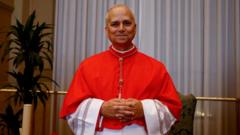*Pope Leo XIV, born in Chicago and long-serving in Peru, calls for peace, unity, and justice during his inaugural address from St. Peter’s Basilica.*
**Historic Election: Pope Leo XIV Becomes First American Pontiff**

**Historic Election: Pope Leo XIV Becomes First American Pontiff**
*Cardinal Robert Francis Prevost's leadership marks a new chapter for the Catholic Church.*
In a historic moment for the Catholic Church, Cardinal Robert Francis Prevost, now Pope Leo XIV, was elected as the first American pontiff on May 8, 2025, following a tightly contested conclave lasting just over 24 hours. Amidst the vibrant crowd in St. Peter’s Square, the announcement erupted in cheers, marking a significant turn in the long history of papal elections.
Pope Leo XIV, who served for two decades in Peru and was elevated by the late Pope Francis to a key role within the Vatican, greeted the faithful with a heartfelt message of peace. His inaugural words resonated deeply, reiterating a commitment to “a united church, always seeking peace and justice.”
His background provides a unique perspective. Born and raised in a suburb of Chicago, Pope Leo spent a substantial part of his clergy in Peru, where he earned citizenship and a reputation as a compassionate leader. Just two years prior to his election, he was appointed a cardinal and tasked with the critical role of overseeing the appointment and management of bishops globally.
The atmosphere in St. Peter’s Square was electric, with many holding high hopes that Leo XIV's election would bridge deep divides within the Catholic Church. After the smoke signaled his election, onlookers celebrated not only the arrival of a new pope but an unprecedented moment in which America’s political complexities might align with those of the Vatican.
The election was marked by intense discussions among the 133 participating cardinals, many of whom were appointed by Francis himself. They faced the challenge of the ideological split between continuing the outgoing pope's inclusive approach or reverting to a more traditional course.
Pope Leo XIV’s election was warmly received in both Chicago and Peru, his dual homes. Celebrations echoed across both regions, where local leaders expressed their pride and support for the new pope. His commitment to marginalized communities and addressing global issues like migration and climate change aligns with the progressive agenda carried through by Pope Francis.
As the newly elected Pope Leo XIV steps into this pivotal role, his focus will not only shape the future of the church but potentially influence global dialogues on pressing socio-political issues. The path ahead for the church aids in preserving its relevance in a rapidly changing world while maintaining its core beliefs. Excitement reverberates through the faithful, hopeful for an era of unity and bridge-building led by their new shepherd.
Pope Leo XIV, who served for two decades in Peru and was elevated by the late Pope Francis to a key role within the Vatican, greeted the faithful with a heartfelt message of peace. His inaugural words resonated deeply, reiterating a commitment to “a united church, always seeking peace and justice.”
His background provides a unique perspective. Born and raised in a suburb of Chicago, Pope Leo spent a substantial part of his clergy in Peru, where he earned citizenship and a reputation as a compassionate leader. Just two years prior to his election, he was appointed a cardinal and tasked with the critical role of overseeing the appointment and management of bishops globally.
The atmosphere in St. Peter’s Square was electric, with many holding high hopes that Leo XIV's election would bridge deep divides within the Catholic Church. After the smoke signaled his election, onlookers celebrated not only the arrival of a new pope but an unprecedented moment in which America’s political complexities might align with those of the Vatican.
The election was marked by intense discussions among the 133 participating cardinals, many of whom were appointed by Francis himself. They faced the challenge of the ideological split between continuing the outgoing pope's inclusive approach or reverting to a more traditional course.
Pope Leo XIV’s election was warmly received in both Chicago and Peru, his dual homes. Celebrations echoed across both regions, where local leaders expressed their pride and support for the new pope. His commitment to marginalized communities and addressing global issues like migration and climate change aligns with the progressive agenda carried through by Pope Francis.
As the newly elected Pope Leo XIV steps into this pivotal role, his focus will not only shape the future of the church but potentially influence global dialogues on pressing socio-political issues. The path ahead for the church aids in preserving its relevance in a rapidly changing world while maintaining its core beliefs. Excitement reverberates through the faithful, hopeful for an era of unity and bridge-building led by their new shepherd.























